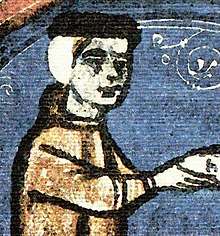Giacomo da Lentini
Giacomo da Lentini, also known as Jacopo (il) Notaro, was an Italian poet of the 13th century. He was a senior poet of the Sicilian School and was a notary at the court of the Holy Roman Emperor Frederick II. Giacomo is credited with the invention of the sonnet.[1] His poetry was originally written in literary Sicilian, though it only survives in Tuscan. His poetry, which was an adaptation to Italian of the Provençal poetry of the troubadours, concerns courtly, chivalrous love.

As with other poets of the time, he corresponded often with fellow poets, circulating poems in manuscript and commenting on others; one of his main correspondents was Pier della Vigna.[2] Some of his sonnets were produced in tenzone, a collaborative form of poetry writing in which one poet would write a sonnet and another would respond, likewise in a sonnet; da Lentini cooperated in this manner with the Abbot of Tivoli.[3][4][5]
A "Canzone" of Giacomo da Lentini
This is one of the most popular poem - "Canzone" (Song) - of Giacomo da Lentini. The italian text is from "I poeti della Scuola siciliana. Vol. 1: Giacomo da Lentini", Milano, Mondadori, 2008, 47-49.
Meravigliosa-mente |
Wonderfully |
References
- "Giacomo Da Lentini."
- Ploom 108.
- Bondanella 255, 551.
- Kleinhenz 62-64.
- Lansing, The Complete Poetry of Giacomo da Lentini (Toronto: University of Toronto Press, 2018.